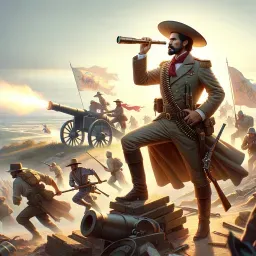”No president who performs his duties faithfully
and conscientiously can have any leisure“

0
0
0
0
- Meaning
- This phrase means that when a President commits to their responsibilities with integrity and a strong sense of duty, the job becomes so demanding that it leaves no room for leisure or relaxation. It suggests that true leadership, especially at the presidential level, requires complete dedication and an immense amount of work.
- Allegory
- In the image, the determined and stern-faced president represents the relentless commitment of a conscientious leader. The stacks of documents and books signify the immense workload a president handles. The dim light from the desk lamp highlights the focus and intensity of this diligent work, while the bustling world outside the window symbolizes the leisure and joys of life that he is missing out on due to his duties. The long shadow cast by the president indicates the profound impact and weight of his responsibilities, mirroring the extensive personal sacrifices made. Together, these elements portray the essence of dedication and the inevitable personal cost of significant leadership roles.
- Applicability
- The phrase’s message can be applied to any leadership or professional role by emphasizing the importance of commitment and hard work. It highlights that significant achievements and responsibilities often come at the expense of personal time and leisure. For someone in a position of power or responsibility, it serves as a reminder that dedication to duty may necessitate personal sacrifices.
- Impact
- This phrase has underscored the expectation of tireless dedication associated with the presidency, contributing to the ideal of the hardworking American leader. It has also been cited in discussions about the intense demands of political leadership and public service roles.
- Historical Context
- James K. Polk served as President from 1845 to 1849. This historical context was a period leading up to and including the Mexican-American War and significant territorial expansion of the United States. Polk was known for his work ethic and for expanding the nation’s boundaries significantly during his presidency.
- Criticisms
- One criticism could be the implied expectation that total dedication to duty and sacrifices in personal life are the only ways to lead effectively. This view might be challenged by arguments that emphasize the importance of work-life balance, even for high-ranking officials, to maintain overall well-being and sound judgment.
- Variations
- Variations of this phrase might be seen in other languages or cultural contexts where the importance of leadership and dedication to duty is emphasized. For example, in many cultures, phrases and proverbs extolling the virtues of hard work and dedication can be found, though the specific focus on the role of a president might differ.
-

I have always done my duty. I am ready to die. My only regret is for the friends I leave behind me.
-

I can never consent to being dictated to.
-

The art of war is simple enough. Find out where your enemy is. Get at him as soon as you can. Strike him as hard as you can, and keep moving on.
-

It is easier to do a job right than to explain why you didn't.
-

It is not strange... to mistake change for progress.
-

I contend that the strongest of all governments is that which is most free.
-

He serves his party best who serves the country best.
-

Uneasy lies the head that wears a crown.
-

There's nothing left to do but get drunk.
-

It is a damn poor mind indeed which can't think of at least two ways to spell any word.
No Comments